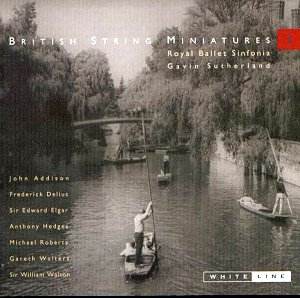As with others in this ASV series of British
light music and overtures, we have here a digestible selection
of the unfamiliar and the established. Familiarity comes in the
shape of Elgar, Delius and Walton and they’re very sensitively
performed. However most interest will centre on the more unusual
repertoire, starting with Gareth Walters’ 1960 Divertimento with
which the disc opens. Walters worked as a BBC producer for a number
of years and his Divertimento was commissioned for performance
by its own orchestra in Cardiff. In five movements the commission
specified that Walters should use Welsh folk music as a base,
but he has actually used only two melodies and these are well
subsumed into the fabric of this perky, well-argued and rhythmically
acute work. Especially attractive are the vaguely neo-classical
opening Allegro vivace and the relaxed lento cantabile. When the
folk-embellished influence comes – in the fourth movement Largo
– it’s the tune Lisa Lân and the melody is very graciously
presented. Michael Roberts, another talented BBC man, composed
these "light classical" works over a decade or so, between
1962 and 1971; they were brought together as a Suite for this
recording. They have a delightful and vivacious charm – listen
to the colour and warm heartedness of the Perpetuum mobile – and
can rise to Haydnesque delicacy, as in Cherubim. A number were
in fact used as television signature tunes and they do have a
melodic immediacy that’s very pleasing.
Fiddler’s Green refers to dance houses and appealing-sounding
"places of frolic" frequented by sailors. Anthony Hedges
evokes the fiddle dances and buzzy Arnoldian shanty style with
aplomb. The Andantino – the third of the four little movements
– is a real winner, deliciously affectionate, the violins leading
with pliant delicacy. Then there’s the quick-fire conclusion,
full of bustle and brio. John Addison’s Partita (1961) is cut
from rather different cloth. The five-movement work shows its
allegiances to Bartók in some tough, sinewy writing, especially
in the toccata-like opening but there’s also plenty of room for
lyrical relaxation here as well. He doesn’t indulge the slow movement.
Instead it’s quite toughly affecting and the March finale likewise
is brisk and stern. Interspersed we have Elgar’s Elegy – touching
if without quite the Barbirolli touch and Delius’s Two Aquarelles,
of which the first is delightfully expressive. Walton’s pieces
from Henry V make up the trio of older works. Sutherland has the
measure of the Death of Falstaff. I’d like to hear him conduct
the Viola Concerto (has he?).
Well up to the now expected standard, it hardly
need be said. I enjoyed this disc as much as the others in the
series. These are lithe and insightful traversals.
Jonathan Woolf
